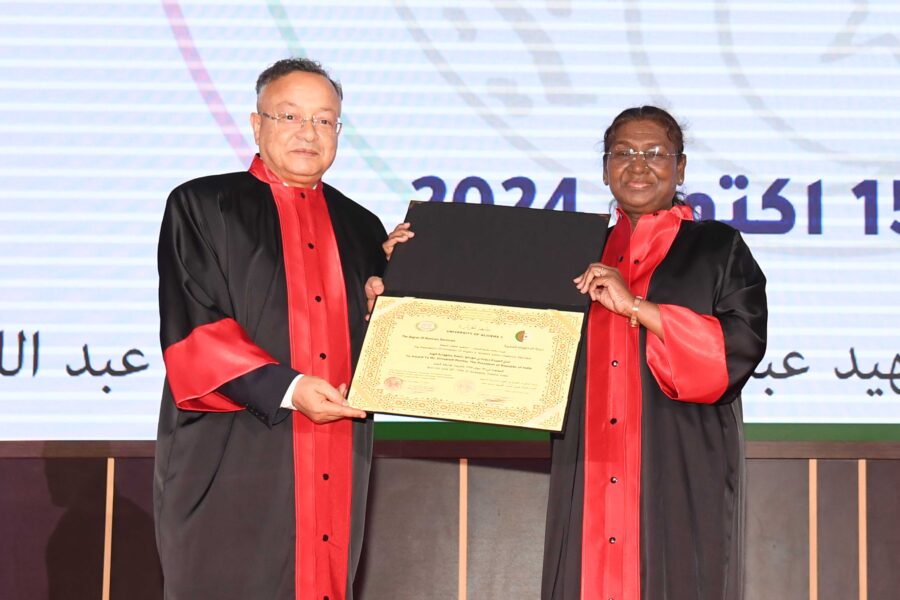President Droupadi Murmu recently underscored India’s distinctive competitive edge, educational prowess, and innovative spirit in the global education landscape. During her acceptance of an honorary doctorate from Algeria’s esteemed Martyr Hidden Abdelhafid University, she underscored India’s unique strength in offering world-class education that’s holistic and affordable, setting it apart from Western institutions. This assertion resonates profoundly, particularly among students from Africa, who have historically sought educational opportunities in India.
India’s commitment to providing accessible, affordable, inclusive, and equitable education has been a cornerstone of its foreign policy, particularly in the African continent. The country’s diplomatic ties with Algeria, forged during the latter’s liberation struggle, have paved the way for robust educational cooperation, knowledge sharing, capacity building, and mutual empowerment. President Murmu’s statement serves as a testament to this enduring partnership and India’s reputation as a global education leader, championing intellectual curiosity, critical thinking, and creativity.
The Indian education sector has witnessed tremendous growth, driven by factors such as:
- Institutional diversity and autonomy
- Academic rigor and excellence
- Innovative pedagogy and andragogy
- Cutting-edge research and development
- Collaborative learning and community engagement
From premier institutions like the Indian Institutes of Technology (IITs) to esteemed universities, India offers a wide range of academic programs that cater to diverse interests, skills, career aspirations, and personality types. Furthermore, the country’s robust scholarship ecosystem, comprising initiatives like the Indian Council for Cultural Relations (ICCR) and the Ministry of External Affairs (MEA) scholarship programs, has enabled numerous African Students can pursue their academic goals in India.

President Murmu’s emphasis on affordable education is particularly significant in the context of Africa’s burgeoning youth population, the continent’s quest for sustainable development, and the need for global citizenship. As Africa strives to harness its demographic dividend, India’s expertise in fields like technology, engineering, management, entrepreneurship, and social entrepreneurship can play a pivotal role in shaping Africa’s future leaders, change-makers, and thought leaders. The exchange of ideas, cultural immersion, and people-to-people connectivity that underpin India’s educational collaborations with Africa will foster a new era of cooperation, mutual understanding, collective progress, and peaceful coexistence.
In contrast to the exorbitant fees charged by Western institutions, India’s education sector offers an attractive value proposition, combining:
- Quality and affordability
- Cultural diversity and inclusivity
- Academic excellence and innovation
- Career relevance and employability
- Personal growth and transformation
Tuition fees, living expenses, and accommodation costs in India are significantly lower, making it an appealing destination for international students seeking a world-class education. This cost-effectiveness, coupled with India’s reputation for academic excellence, has contributed to the country’s emergence as a preferred education hub, a magnet for global talent, and a beacon of intellectual curiosity.
India’s education sector has emerged as a beacon of excellence, offering affordable and high-quality learning experiences. President Droupadi Murmu recently highlighted India’s competitive edge in the global education landscape. With its rich academic heritage, innovative spirit, and holistic approach, India provides an ideal environment for students to flourish. From premier institutions like IITs to esteemed universities, India offers diverse academic programs catering to various interests and skills.
Read More: Transforming Lives: India’s Initiative for Youth Skill Development
India’s diplomatic ties with Africa, formed during Algeria’s liberation, have evolved into a thriving educational partnership. This historic connection facilitates knowledge sharing, capacity building, and cultural exchange. India now offers African students accessible, holistic education.. India’s scholarship programs enable African students to pursue education, fostering mutual understanding and collective progress. As Africa harnesses its demographic dividend, India’s expertise in technology, engineering, and entrepreneurship can shape future leaders.
Key Takeaways:
- President Murmu stressed India’s commitment to providing African students with affordable, high-quality education, rivaling Western institutions at a lower cost.
-India prioritizes accessible education, fostering a strong India-Africa partnership and empowering African students through initiatives like ITEC and ICCR scholarships. - Historical ties between India and Algeria underpin robust educational cooperation.
- African students can pursue an education through India’s scholarship schemes.
- Affordable education fosters greater India-Africa collaboration and mutual understanding.

